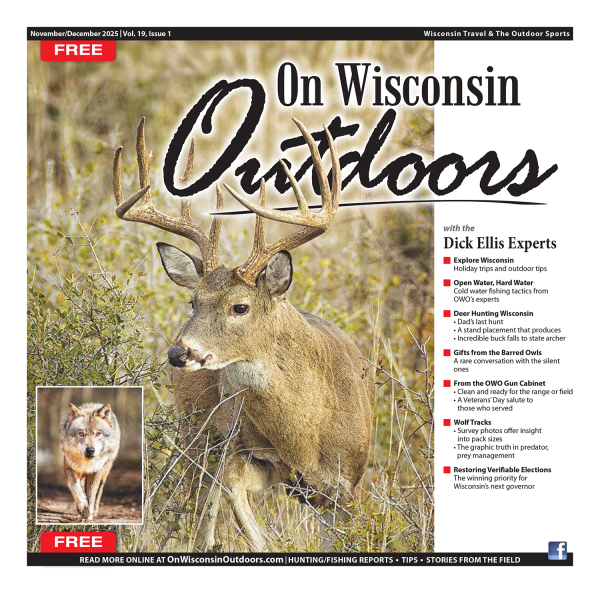Predicaments: Horseflies
Many lakes are formed because of a dam. The rivers that fill those lakes are called feeder rivers. I was told that, in late summer, bass sometimes migrate up these feeder rivers because of the cooler oxygenated water. The Clintonville Pond lies 16 miles north of my home and it has a feeder river called the Pigeon River. Jumping into a new adventure, sometimes without enough preparation, is a dangerous trait of mine even though this trip seemed very innocent. I decided to test the theory of bass moving out of the Clintonville Pond and up into that feeder river.
I had never fished this river, but I had caught several bass in the Clintonville Pond during the spring. If those bass migrated into the Pigeon River, concentrating there, it could certainly be fun catching them. Would there be bass in that river this summer? One hot day in August, I planned a fishing trip to find out. I packed a little bit of fishing gear. Then I loaded my sturdy 16-foot canoe on top of my car. Planning a float trip takes a bit of maneuvering and some help. My father-in-law used his station wagon and was the helper for this trip. A trip I will never forget.
The spot I chose to begin this excursion was at a bridge a few miles upstream from the Clintonville Pond where I dropped off my canoe. My father-in-law followed me with his vehicle and we drove to the dam where I would pull out at the end of the trip. I left my car at the dam. I jumped in with my father-in-law and we drove back to my canoe at the bridge.
I have made several other trips in this canoe. When floating rivers, I often bring a heavy car battery and an electric motor to guide and position my canoe. This makes it possible to put down the canoe paddle and spend more time fishing. It looked like the water that day was a little low and too shallow for the electric motor to work. I decided to leave the motor and heavy battery in the car.
My father-in-law helped me unload and, when I thought I was ready, he waved as he headed home in his car. Boy I was really not ready for what happened.
A few annoying horseflies greeted me as I dragged the canoe through the tall grass and into the wooded area beside the river. My anticipation of catching those bass was a distraction from the bothersome horseflies. The original plan was to peacefully drift downstream and fish for the bass that hopefully would be as plentiful as the spots on a fawn. As I floated into the realm of this shaded river, the horseflies were no longer only bothersome. They began to swarm me and they became infuriating and relentless. I swatted and swiped at them but it seemed the more commotion I made, the more flies it attracted. I did not wear shorts, which turned out to be one of the few good choices I would make on this trip. The shirt I had on was a thread bare T-shirt with huge holes in the belly. On past fishing trips, when I carried the heavy car battery, it would rest against my belly. My wife and I wondered why I had holes in the belly of so many shirts. Finally after destroying several shirts, we realized that battery acid was slowly dissolving my clothes. I did not want to destroy any more shirts so I made what turned out to be a very poor choice. I wore one of the worn out t-shirts with the holes. That left more skin exposed for the tenacious flies.
Every square inch of my exposed skin turned into a horse fly target and was under constant attack. If I was not fast enough on the swat, I was bitten. Each bite became an extremely painful welt that lasted for more than an hour. With my father-in-law now long gone, I was left alone to fend off these tormenting flies.
Any levelheaded thinking on my part was side- tracked because of the distraction of the tormenting hordes of flies. I had a paddle and a canoe but not enough good judgment to do the smart thing. All I could think of was paddle my canoe to the pull-out at the dam. I tried paddling quickly, unrealistically thinking that maybe if I moved fast enough, the flies would not catch me. It was worthless to try and fish because I would be bitten whenever I took the time to reach for my fishing pole. I tried to simultaneously paddle and swat at the flies before they added yet another painful welt to me. This ingenious plan did not work either. I was literally, up a creek with a useless paddle. Pure desperation took over. I just couldn’t take it any more and I jumped into the river. The cool water temporarily relieved the sting of the fly bites. Unfortunately, when I lifted my head above water to breathe it only took seconds for the flies to find me. I would need scuba gear for this plan to work.

Next a more primal survival instinct kicked in. I did not have any extra clothes to cover my skin. What could I use to protect myself? I went to the edge of the river and scooped out the gooiest, slimiest, stickiest mud I could dig up and slabbed it all over. I covered my face, arms, neck, and, especially, belly. It wasn’t pretty but self-preservation trumps good looks. The plan worked as long as the mud was thick and I moved very slowly. Moving fast would shake off my precious coat of mud. I learned quickly how to gently paddle with no sudden movements. Here was yet another predicament, if a bit of mud slipped off, an area of skin was uncovered. When a fly would tear into that uncovered skin, the impulse to swat that fly would be overwhelming. When I swatted, mud would fly off, exposing more skin, and thus more bites. Soon I would jump back in the river and start again with another application of mud. This whole situation was aggravated by the fact that this tiny river must not have been floated for years. Every so often a brush pile or entire tree would have to be maneuvered through or portaged around. If you want a challenge, put thick mud on your face and arms, then try to pull a canoe through thick brush without losing any of the precious goo.
After a couple of unbearable hours, I finally reached the open lake. The horse flies suddenly disappeared. It seems they do not like direct sunlight. There were people boating and fishing on the lake as though nothing had happened. I do, however, remember getting some strange looks.
I take pride in the fact that when I go fishing, I can usually find a way to catch fish. I did not find a way to catch a single fish this trip. In fact, I never even made a cast. The pain from the first few bites was beginning to subside and, in another hour or so, the pain from hundreds of other bites would be gone. Now I was as relaxed and relieved as I could have been in the last few hours. Or was I? Later I devised an almost painless plan, which, if utilized in a similar situation, would save a great deal of agony. I must confess that it took a while after the fact when this brilliant idea dawned on me. Next time I am not prepared for a horde of horseflies, I will not panic like I did last time. This time I will paddle back up to the put-in spot, by the bridge. I will leave the canoe there and head for the road. A road that is showered in glorious sunlight. Then cheerfully walk down that road to my car by the dam.
On a side note, in hot weather I have seen deer inexplicably run out of the woods and into a field jumping and kicking. Now I understand why they do that and sympathize with them.
Want to read more stories like this? Predicaments: Mostly True Hunting and Fishing Stories can be purchased at www.amazon.com , print and digital editions are available. Print copies can also be purchased at Johnny’s shop of Bait in New London WI.
Randy Williams lives in New London, WI. He has a degree in conservation, is a fishing guide, and a taxidermist. He has won over 40 fishing tournaments and spent 5 years as a co-host on an outdoor TV fishing and hunting show called No Excuses Outdoors. He has been an outdoor columnist for the Waupaca county Post and recently published a book called Predicaments:Mostly True Hunting and Fishing Stories. He now enjoys hunting and fishing full time after retiring from teaching. To watch videos of his adventures visit www.wilfish.com






